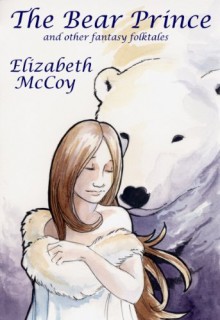
The Bear Prince and Other Fantasy Folktales is a collection of three stories of the sort that might be told in the author's “Lord Alchemist” world. You have to note this as you're buying the e-book, because McCoy never specifically names that world in the text – she just says that it's a world where magic exists and alchemy has replaced chemistry. This is probably because McCoy published this work prior to publishing Herb-Witch, the first book in her Lord Alchemist series.
At any rate, I think this collection would work fine for someone with no familiarity with the Lord Alchemist series. However, those who are familiar with it would probably get more out of the author's afterword, which briefly explains some of the thought processes involved in creating stories that could conceivably be told in that world. The afterword was actually my favorite part of the e-book. It made me wish McCoy had written “author's notes” sections for each of the three stories.
“The Bear Prince”
In this story, a girl, the youngest child in a very poor family, finds a gorgeous white fur coat. The girl has always worn hand-me-downs, so she knows that if she brings it home it will go to either her brother or her eldest sister, even though they both already have warm coats. She tries to think of someone else she could give it to who would need it more, but then she comes across a shivering man who appears to be the coat's true owner.
This was the first of the three stories and (I think) the only one specifically referenced in Herb-Witch. Kessa had heard it as a child and had said she'd have given the bear's pelt to Laita. Thinking of that made me sad for Kessa all over again. She considered herself neither deserving of the fur, nor of the “happily ever after” ending with the bear prince.
I had wanted to read this story ever since seeing it mentioned in Herb-Witch, and I liked it because of that connection. However, I don't know how well it would have worked for me if it hadn't been for that. I couldn't decide whether I was supposed to view the girl in the story as generous and kind or just practical and well aware of her place in life. She only gave the coat to the prince because she knew she would probably have been accused of theft if she hadn't, and she only rejected all his rewards because she knew they either wouldn't last or would be taken away from her.
“The Princess and the Sheep's Wool”
This is basically the Lord Alchemist world version of a “Princess and the Pea” story. A young woman is proven to be a royal-blooded princess via various tests, the last of which involves her sense of smell.
Of the three stories in this collection, this is the one with the clearest connection to the workings of McCoy's Lord Alchemist world. The three tests the princess undergoes will make the most sense to readers who know that alchemists in that world must have finely developed senses of taste and smell, and hopefully some degree of tolerance or even immunity to poisons and alchemical preparations.
“The Jewel of the Moon and Starlight”
A girl from a poor family runs away so that they have one less mouth to feed. She encounters a warrior princess who is being pursued by a dragon. Before being captured, the princess manages to give the girl a jewel that she says can destroy the dragon. For a brief while, the girl lives in the princess's empty castle, staying out of sight of the dragon. She knows that, if she does nothing, she could easily continue to live there, with all the food, riches, and shelter she might ever need. However, now that she is no longer hungry and cold, she is able to think about and empathize with other people. Doing nothing would give her a cushy life, but it wouldn't help her family or the people trapped by the dragon's magic, so she decides to try to defeat the dragon.
This one had a very clear message about poverty: people who are well-fed and comfortable are better able to think about the needs of those besides themselves. This was the longest of the three stories and felt, to me, the least like a folktale or fairy tale. For some reason it reminded me of Jeannie Black's Ring of the Ruby Dragon, that "choose your own adventure" book I read a while back.
All in all, these stories were okay, but the collection was very short and a bit unsatisfying. It felt like it needed more. More stories, or enhanced content, or both. I already mentioned that expanded author's notes would have been nice. I could also see this as being a really nice illustrated e-book. The stories on their own just felt kind of...meh.
(Original review posted on A Library Girl's Familiar Diversions.)

 Log in with Facebook
Log in with Facebook 





